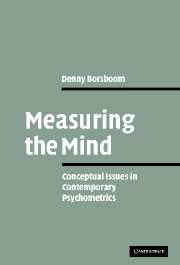1 - Introduction
Published online by Cambridge University Press: 22 September 2009
Summary
The measured mind
Psychological measurement plays an important role in modern society. Teachers have schoolchildren tested for dyslexia or hyperactivity, parents have their children's interests and capacities assessed by commercial research bureaus, countries test entire populations of pupils to decide who goes to which school or university, and corporate firms hire other corporate firms to test the right person for the job. The diversity of psychological characteristics measured in such situations is impressive. There exist tests for measuring an enormous range of capacities, abilities, attitudes, and personality factors; these tests are said to measure concepts as diverse as intelligence, extraversion, quality of life, client satisfaction, neuroticism, schizophrenia, and amnesia. The ever increasing popularity of books of the test-your-emotional-intelligence variety has added to the acceptance of psychological testing as an integral element of society.
When we shift our attention from the larger arena of society to the specialized disciplines within scientific psychology, the list of measurable psychological attributes does not become shorter but longer. Within the larger domain of intelligence measurement, we then encounter various subdomains of research where subjects are being probed for their levels of spatial, verbal, numerical, emotional, and perceptual intelligence; from the literature on personality research, we learn that personality is carved up into the five factors of extraversion, neuroticism, conscientiousness, openness to experience, and agreeableness, each of these factors themselves being made up of more specific subfactors; and in clinical psychology we discover various subtypes of schizophrenia, dyslexia, and depression, each of which can be assessed with a numerous variety of psychological tests.
- Type
- Chapter
- Information
- Measuring the MindConceptual Issues in Contemporary Psychometrics, pp. 1 - 10Publisher: Cambridge University PressPrint publication year: 2005



